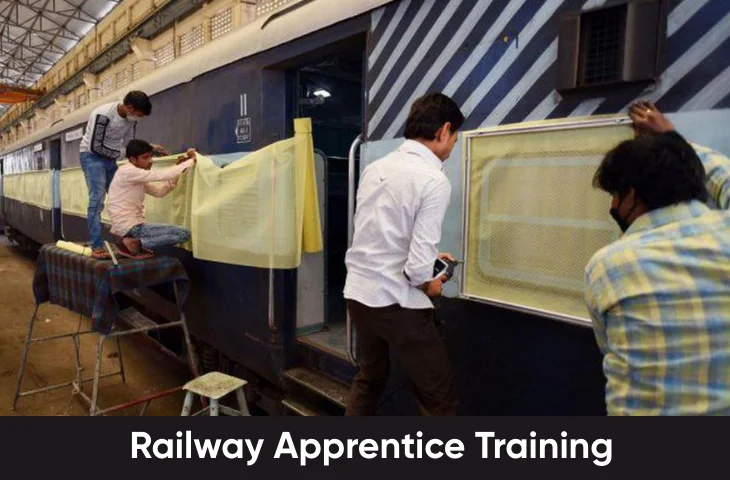The Indian Railways, one of the world’s largest employers, provides excellent opportunities for skill development and career building through its railway apprentice training programs. These training routes, available for ITI certificate holders and diploma graduates, prepare young aspirants for technical roles within the vast railway network.
Introduction to Railway Apprentice Training
Railway apprentice training is designed to create a skilled workforce that can manage the technical, operational, and mechanical demands of the Indian Railways. It not only offers hands-on experience but also paves the way for stable careers in government service.
Importance of Apprentice Training in Railways
Apprentice training ensures that fresh graduates and ITI students develop practical skills.
It bridges the gap between theoretical knowledge and real-world railway operations.
- Creates job-ready candidates.
- Enhances technical expertise.
- Provides exposure to large-scale infrastructure projects.
Routes to Railway Apprentice Training
Railway apprentice training can be pursued mainly through two routes – ITI (Industrial Training Institute) route and the Diploma route.
ITI Route
The ITI route is open to candidates who have completed their 10th standard and pursued vocational courses in technical trades.
- Duration: Generally ranges from 1 to 2 years.
- Eligibility: 10th pass + ITI certificate in specific trades (like fitter, electrician, welder, mechanic, etc.).
- Training Scope: Focus on practical aspects like workshop maintenance, track machinery, electrical wiring, and coach repair.
Diploma Route
The Diploma route is for candidates who have completed a three-year diploma in engineering disciplines.
- Duration: Generally 1 year of training.
- Eligibility: Diploma in Mechanical, Electrical, Civil, Electronics, or related streams.
- Training Scope: Advanced technical exposure to rolling stock, signal systems, and project implementation.
Selection Process for Railway Apprentice Training
The recruitment for apprentices is announced by the particular Railway Zones in India. Candidates must apply online, and selection is usually based on merit.
- For the ITI route: Marks obtained in the 10th and the ITI are considered.
- For the Diploma route: Performance in diploma academics plays a major role.
- Some zones may conduct interviews or document verification.
Key Benefits of Railway Apprentice Training
Railway apprentice training provides both short-term learning benefits and long-term career prospects.
- Practical Training: Real-time work in workshops, stations, and depots.
- Stipend Support: Apprentices receive a monthly stipend.
- Skill Certification: Recognized by government and industry bodies.
- Career Opportunities: Chances of absorption in Railways or eligibility to apply for exams like RRB ALP, RRB JE, and Technician posts.
Challenges Faced During Training
Though rewarding, the training process has its share of challenges.
- Highly competitive selection process.
- Physical and mental demands of technical training.
- Limited absorption into permanent roles (recruitment is separate).
Future Scope of Railway Apprentice Training
The Indian Railways is expanding rapidly with modernization, electrification, and high-speed projects. Apprentices with ITI and diploma backgrounds have increasing opportunities.
- Demand for a skilled workforce in semi-high-speed and metro projects.
- Scope in the Electrification of Indian Railways and the digital signaling domains.
- Enhanced employability in both government and private sectors.
Summary of Railway Apprentice Training
We have given below the key points summarizing the Railway Apprentice Training. Check out the given information:
- Railway apprentice training builds technical expertise for railway operations.
- Two main routes: ITI route (after 10th + ITI certificate) and Diploma route (after engineering diploma).
- Selection is merit-based, with some zones conducting document verification.
- Provides stipends, skill certificates, and career growth opportunities.
- Though not a guarantee for permanent jobs, it acts as a strong stepping stone for RRB exams and industry careers.
The railway apprentice training program is a gateway for aspiring technicians and engineers to gain practical knowledge, earn while learning, and build a career in one of India’s most vital sectors. Whether through the ITI or diploma route, apprenticeships equip youth with skills that remain relevant not just in railways but across industries. With India’s rail network moving toward modernization and electrification, trained apprentices will play a central role in shaping its future.
FAQs
The railway apprentice training program is a gateway for aspiring technicians and engineers to gain practical knowledge, earn while learning, and build a career in one of India’s most vital sectors
The recruitment for apprentices is announced by the particular railway zones in India.
Railway apprentice training can be pursued mainly through two routes – the ITI (Industrial Training Institute) route and the Diploma route.
The selection process for railway apprentice training is as follows:
For the ITI route: Marks obtained in the 10th and the ITI are considered.
For the Diploma route: Performance in diploma academics plays a major role.
Apprentice training ensures that fresh graduates and ITI students develop practical skills. It bridges the gap between theoretical knowledge and real-world railway operations.

Hello! This is Arijit Dutta. I am a skilled Content Writer at Oliveboard with nearly 3+ years of experience in crafting engaging, informative, and exam-focused content for the Railways Domain. With a strong command of language and a keen understanding of learner needs, I contribute significantly to Oliveboard’s mission of delivering high-quality educational resources. Passionate about clear communication and continuous learning, I consistently create content that helps government job aspirants achieve their goals. Outside of work, I enjoy playing cricket and listening to music, which helps me stay balanced and creative in my professional journey.
